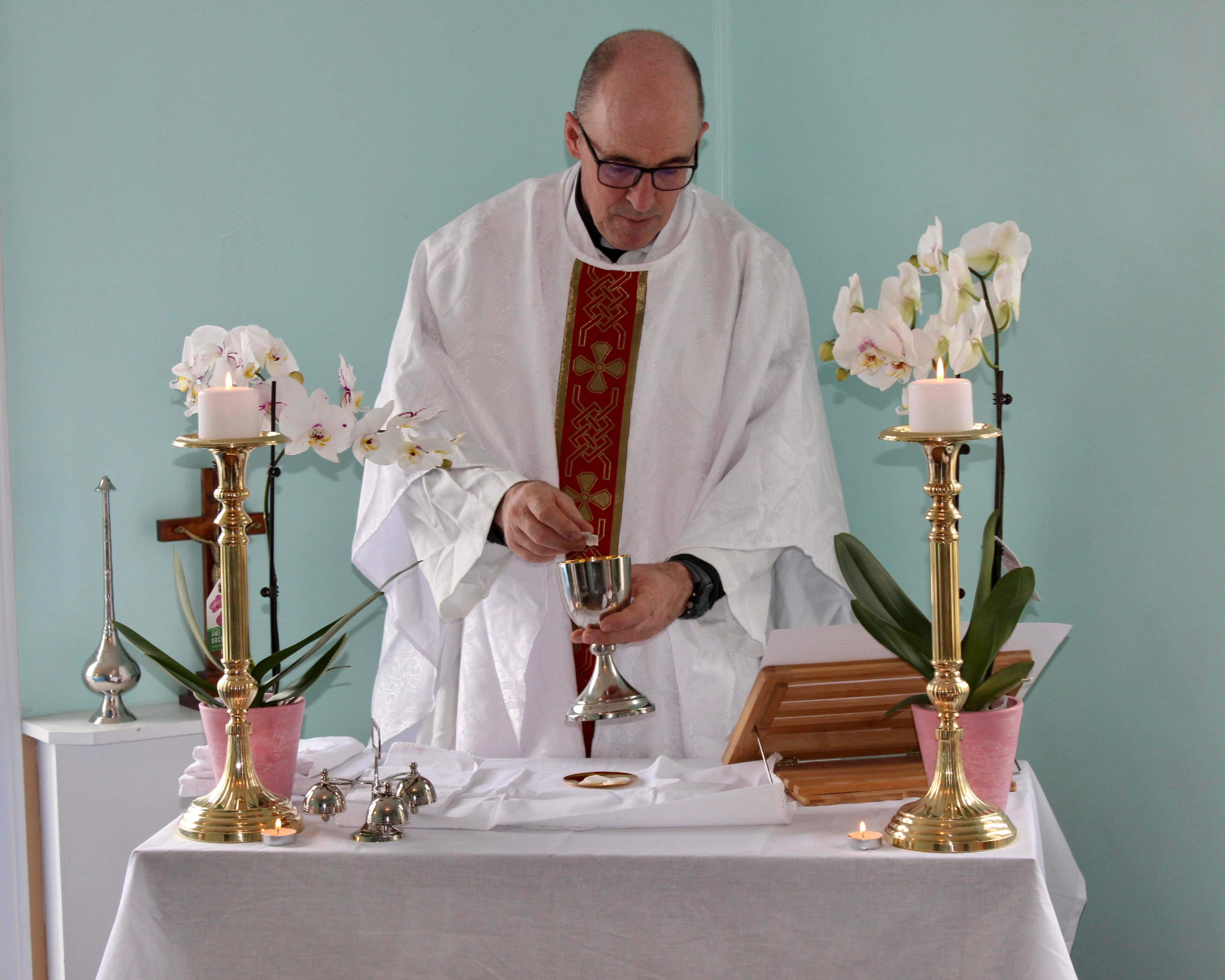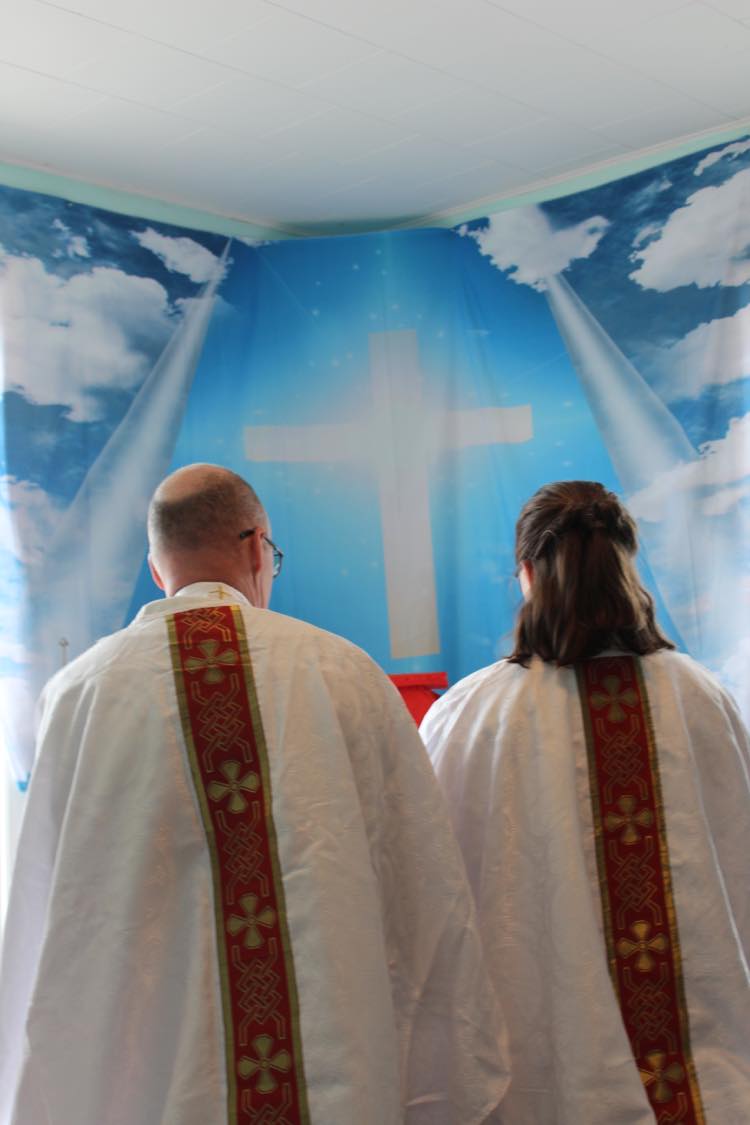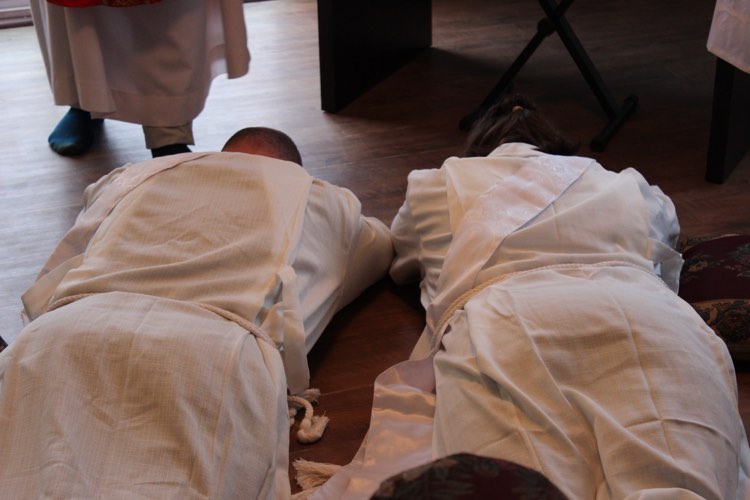- Home
- Seminary Studies
- The Stages of Spirituality
Simply Catholic and Welcoming You
The Stages of Spirituality

Fr. Philip Conducting Mass
The stages of spirituality and spiritual growth are often discussed in terms of stages or levels thereof, encompassing various experiences and perspectives, ranging from initial seeking to deep integration and connection.
It all starts with our ‘church of origin’, our experienced faith. Prayers in church. The social connections we experience there. Prayers, devotions and lived faith experiences in our homes. Discussions and experiences around the concept and application of religion and faith at school. All of these things are absorbed as our experienced faith.
Experienced faith grows by participating in the customs and rituals of our faith tradition with other Christians/Catholics. It is the lifelong foundation of our faith.
Our faith ten grows and develops by belonging to an accepting Christian/Catholic community. Then by questioning and internalizing what we have long been taught. Until, finally, it truly is our own faith. No longer simply the faith of our fathers. Now our faith is owned and integrated within our very being.
The Christian/Catholic churches generally break this down into three stages;
Purgative (Purification):
In comparing our growth as a person and attempting to align this with our spiritual development this would be our babyhood/childhood experience.
This stage involves purifying oneself from negative emotions, attachments, and limiting beliefs to make way for spiritual growth. Often beginning with a sense of a need for meaning or purpose beyond the ordinary, often triggered by life experiences or a sense of dissatisfaction.
This stage involves a period of upheaval or chaos, as the individual confronts their limitations and seeks a deeper understanding. With a turning away from sin and embracing virtue, often described as a "childhood" stage of spiritual development.
It focuses on purification, breaking free from habits of sin and seeking to live a life pleasing to God and further focuses on discipline, self-control, and detachment from worldly desires.
This stage is characterized by an initial conversion and a deepening understanding of God's will.
Illuminative (Illumination):
Now we enter our spiritual equivalent of youth. This stage involves seeking knowledge and understanding of the spiritual path, often through study, practice, and contemplation.This dimension involves seeking direct experience of the divine or a higher reality.
Most usually marked by a deepening relationship with God, where one seeks to understand God's will and the circumstances of their life. Individuals may experience a sense of separation from their old self and a realization of their true potential.
It involves a constant attention to thoughts and sentiments that lead the soul to God and focuses on applying spiritual principles in daily life and serving others.
This stage sees the soul increasingly taking on the mind and heart of Christ.
Unitive (Union):
Finally we mature in our faith, becoming spiritual adults.This stage involves achieving a state of union with the divine or a deeper sense of connection and oneness with all things. This stage involves a growing sense of certainty and purpose, leading to a deeper connection with oneself and the world.
This involves a profound union with God through love, where prayer becomes more contemplative and virtue matures.
It's characterized by the experience and practice of love for God, others and self, while focusing on applying spiritual principles in daily life and serving others. Continued growth here involves questioning societal norms and advocating for justice and compassion.
This stage can involve profound experiences of God's presence, as exemplified by the lives of the saints.It usually involves profound and long-lasting changes, with individuals experiencing a sense of unity with the Divine or a quiet peacefulness.
At the point of full ‘maturity’ or integration an individual will feel connected to all life, especially other people, at peace with themselves and aware that even as they can now experience the ‘Divine through me’ so others may discover their path to God through their interactions with this individual.
The Stages of Spirituality An Essential Knowledge and Skill For Effective Ministry

Amma Charlene Conducting Mass
In seeking to understand the stages of spirituality and why these are important in our ministry it is useful to draw the parallels between the stages of personal growth attributed to our growth from birth to adulthood, this is also inherently inaccurate. Clergy cannot presume that the stages of spiritual growth and chronological growth run together.
Just as we all know people who were late to mature or even ‘never grew up’, this also happens with spiritual growth. If we, as clergy, think that we have a well adapted adult before us so they must be as well matured in spiritual matters, we can be setting them and ourselves up for a world of hurt.
Just as people grow at different rates physically, mentally and emotionally so too spiritual growth is an individual thing. Even a very senior citizen may be approaching faith and religion as a relative newbie. A spiritual newborn or youngster.
People must always be given the correct ‘tools’ for their developmental stages. That is as true in martial arts as in mathematics and as true in spiritual maturity as in emotional maturity.
The scriptural reference is "milk before meat" in 1 Corinthians 3:2, which states, "I gave you milk, not solid food, for you were not yet ready for it. Indeed, you are still not ready." This passage illustrates that foundational, simpler teachings are presented first before more complex and challenging doctrines.
In essence, this passage suggests that a progressive approach to spiritual learning is necessary. Simpler truths are presented first, allowing individuals to develop a foundation before moving on to more advanced concepts.
Asking, let alone expecting too much too soon can and will cause people to stop investigating the faith and their own progression in it.
Always proceed with caution and get to know each individual personally (build relationships of trust) before trying to download everything you want them to know (or worse, want them to know that you know) about faith or religion.
It is extremely important to understand the stages of spirituality and relative spiritual maturity in order to meet those we serve in a manner that actually allows us to effectively serve them as they uniquely need to be served.
Their levels of mental and emotional maturity will give us insights into the language and subject material we can use but it is their spiritual maturity or lack thereof that determines what and how of what we attempt to share, teach or otherwise impart to them.
It becomes even more important to understand where someone is on their own spiritual journey before we decide what to ask from them. Remember it is the job of clergy to lead people to Christ, not to impress them or blow them out the door by overwhelming them.
It is always about relationships. Our relationship with Christ. Our relationship with those we serve and the relationship they develop with Christ. Salvation is about developing a relationship with Christ. When we help each person in our care to effectively do that and we are then effective clergy!
Recent Articles
-
Catholic-Confession
Apr 19, 25 08:53 PM
Full breakdown of the Catholic Confession Sacrament of Reconciliation -
Ordination, incardination and dismissal of clergy
Mar 03, 25 06:47 PM
Overview of Ordination to Holy Orders, incardination and dismissal of clergy -
Catholic Last Rites
Mar 03, 25 06:41 PM
An explanation of the Catholic Last Rites and Anointing of the Sick


